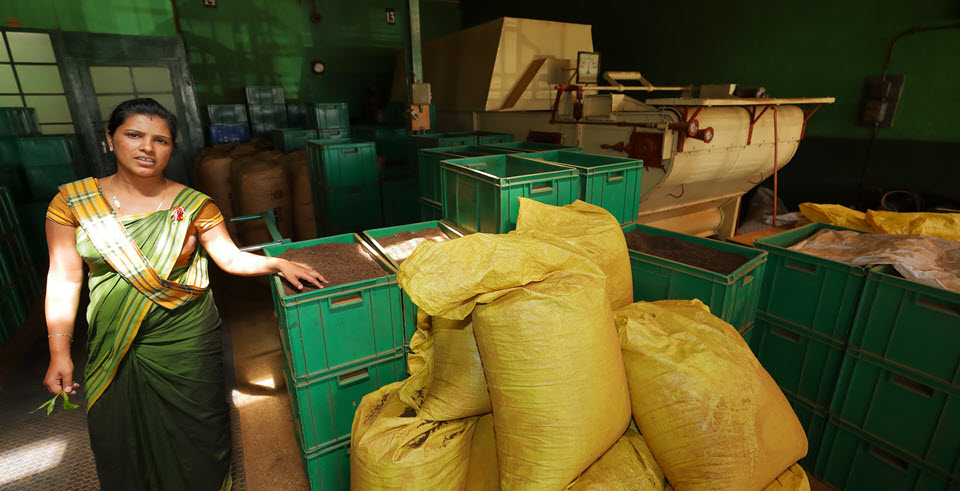
Listen to Episode 120
Tea News for the week ending June 9
| As Temperatures Rise, Tea is Ideally Suited to Quench the World’s Thirst
Consumers favor boldly flavored, non-sweetened blends
| Kenya’s Costly Tea Crisis
| The Tea Association of India Lists Industry Concerns
Hear the Headlines
PLUS
Tea Biz traveled to Sri Lanka in May to speak with Romesh Walpola, CEO of Tea Smallholder Factories, at his offices in Colombo. Walpola later arranged a visit to the Neluwa Madagama Tea Factory, one of the company’s seven bought-leaf factories. Combined, these factories produce three million kilos of black tea a year. Walpola explains that investing in training, wellness, and educational programs, including internships for second-generation farmers, earns the loyalty of thousands of small tea growers and is one reason why the company’s teas get top dollar at auction.
Listen to the Interview
Cold Brew is Steaming Ahead
Globally as temperatures rise, thirst-quenching iced and cold-brewed teas are experiencing a boost in demand. The global market for cold-brewed teas, estimated at $215 million in 2020, is small but fast-growing, with cafes, on-tap, and ready-to-drink opportunities.
Consumers prefer low or non-sweetened brewed teas (not from powder or concentrate) with bold natural flavors—teas fused with health-enhancing ingredients such as black tea and coconut milk, for example, or green teas and citrus. Black tea blends well with berries and herbs; think strawberry basil and mint with melons or cherries and thyme.
Cold and ambient teas brewed in carafes and served in wine glasses are featured in trendy restaurants and in formulations for hard seltzers and clean energy drinks. The brewing process produces a clean, mild taste without astringency or the carbonic acidity of soft drinks and ciders.
The trend is away from hard alcohol and high-ABV beverages. IWSR Drinks Market Analysis writes that globally RTDs grew by only +2% last year compared to historical growth of +20% from 2018-2021. “The key US market decelerated sharply,” according to IWSR, noting exceptions for hard iced tea, cocktails, and flavored alcoholic beverages (FABs). IWSR identified India, Mexico, and Brazil as the new volume growth drivers, while the “US and China remain key to the industry’s value growth.” India and Mexico accounted for more than half of all volume growth in 2022.
Top sources of future RTD growth include hard tea in the US.
“RTDs are constantly evolving in the US due to changing consumer demand and interest. One trend that remains solidly entrenched is premiumization,” writes IWSR CEO Mark Meek. IWSR expects a relative shift in treating oneself to higher priced products from on-premise outlets to at-home consumption, a behavior learned during the pandemic and evident in tea.
“In most mature markets, premiumization looks to be embedded into consumer purchasing behaviors and will continue to add value in most price tiers, albeit at slower growth rates,” notes Meek. “Consumers continue to trade up in developing markets as incomes rise.”

Kenya’s Costly Tea Crisis
By Dan Bolton
Lockouts after violent street protests, vandalism, and the organized theft of green leaf could cost Kenya’s tea industry an estimated 350 million shillings a week in lost production.
Auction prices are stable, but uncertainty led Tanzania to abandon Mombasa. The Ministry of Agriculture announced that its teas would be sold at the digital auction based in Dar es Salaam beginning in June.
Transactions at the Kenya Tea Auction totaled more than KSh130 billion shillings in 2022 ($1.07 billion US dollars).
Much of this tea was grown in Nandi, Nyamira, Bomet, and Kericho counties, where tea workers confronted police on May 26 after destroying harvesting equipment. One person was killed, a reporter was stuck in the forehead by a stone, and more than 100 protestors were arrested. Police charged 11 people for destroying nine harvesting machines, tractors, and a police car, according to The East African.
Ekaterra Tea has indefinitely halted operations in Bomet and Kericho counties, idling 16,000 workers. Growers, including James Finlay Kenya, have scaled back operations across the region due to security concerns.
Discussions are underway with growers, local authorities, elders and youth representatives, and labor leaders jointly seeking a solution.
Last week at a press briefing in Mombasa, Arthur Sewe, who chairs the East Africa Tea Trade Association (EATTA), said tea produced in Kenya accounts for 40% of sales at the Mombasa Auction. According to Sewe, closing the nation’s tea gardens would cost Kenya $2.5 million weekly in lost foreign exchange currency (KSh350 million). He expressed concern that idled workers facing high inflation are evolving into organized criminal groups.
“Invaders illegally pluck the green leaf in broad daylight. This means there could be some factories buying from them,” according to The Star.
EATTA sent a warning to members to stop processing leaves from unknown suppliers. “Any of our members running these tea factories found absorbing stolen leaf will be dismissed or de-registered and not allowed to trade at auction,’’ he said.
In related news, The Rainforest Alliance withdrew its certification of Kenyan tea estates implicated in a BBC report that led to an ongoing police investigation of sexual exploitation. The BBC exposé led some retailers to halt purchases, compounding lower demand from major trading partners Egypt and Pakistan.
BIZ INSIGHT – It is difficult to assess the damage to the reputation Kenya’s tea industry is experiencing against the backdrop of a general uprising that began in March with anti-government protestors angry over the rising cost of basic goods. During weeks of unrest, Nairobi police arrested hundreds of protestors who defied a government ban on public rallies. Kenyan opposition leader and former prime minister Raila Odinga encouraged protestors after losing his fifth presidential campaign.

The Tea Association of India Lists Industry Concerns
By Aravinda Anantharaman
The Tea Association of India issued a press statement this week listing the challenges faced by the tea industry in Assam and North Bengal, where a prolonged extreme temperature and insufficient rainfall significantly reduced tea production.
TAI estimates that crop reduction in Terai, Dooars, and Darjeeling in May has been 25%, 30%, and 40%, respectively. In south India, UPASI reported that April saw a 12% decrease compared to the same period in 2022. The Tea Research Institute has estimated a reduction of 50% in rainfall in the Dooars in May which has impacted production and increased pest attacks.
Exports have taken a hit. Iran, which accounts for 25% of tea exports, has yet to sign contracts for existing orders this year. TAI also said that the industry faces subdued demand in both international and domestic markets, attributed to the oversupply of tea in the global market and shifting consumer preferences.
Auction prices are also showing a downward trend. In South India, tea prices have shown a 12 percent decrease from January to May 2023, while North India shows a 7% dip from April to May. The average prices for Sales 1 through 20 in 2023 have decreased by 5-9% (for North India, orthodox, and Darjeeling teas).
The TAI has called for the industry to work collectively to explore new market opportunities, promote the unique qualities of Indian teas, and address any regulatory barriers that hinder trade.
FEATURES

The Smallholder Factories Cultivates Supplier Loyalty and Respect
By Dan Bolton
Romesh Walpola, Chief Executive Officer of Tea Smallholder Factories, at his offices in Colombo. He later arranged a visit to the Neluwa Madagama Tea Factory, one of the company’s seven bought-leaf factories. Combined, these factories produce three million kilos of black tea a year. Walpola explains that investing in training, wellness, and educational programs, including internships for second-generation farmers, earns the loyalty of thousands of small tea growers and is one reason why Smallholder Factory Teas get top dollar at auction.
Listen to the Interview
Share this episode with your friends in tea.
Signup to receive Tea Biz weekly in your inbox.


